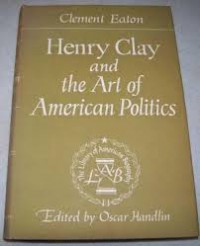A good introduction to "the Great Pacificator"

Though the antebellum era in American history is sometimes called the "Age of Jackson," a strong case could be made that the dominant political figure of the era wasn't Andrew Jackson but his longtime opponent Henry Clay. In a political career that stretched over the first half of the 19th century, Clay served as a state legislator, United States Congressman, Secretary of State, and United States Senator, earning the nicknames "the Great Pacificator" for the series of compromises he crafted in order to maintain sectional peace and harmony. Yet Clay failed in his three attempts to gain the highest political office in the land, and died on the eve of the unraveling of all of his efforts over the national schism created by slavery.
Clay has not wanted for biographers, with the result being that there are many fine books available about his life and career. Yet it is difficult to find a better introduction to the man than Clement Eaton. A distinguished historian of the antebellum South, Eaton's command of the era is on full display in this book, which manages to encapsulate both Clay's life and his times in just two hundred pages. As the title indicates, Eaton sees Clay as an artist in his ability to reconcile the often conflicting interests of an increasingly divergent nation, an ability he credits to Clay's ability to craft deals and sell them through his political abilities. Yet Eaton also identifies a change in Clay from rising young Westerner to a member of the sociopolitical elite that ran counter to the rising democratic sentiment of the era, and likely played a role in his failure to win the presidency. While Eaton's analysis begs for more elaboration than is possible in the space available, his book remains an excellent starting point for anyone seeking to learn about his charming subject, who dominated American politics in a way that few others have since.






